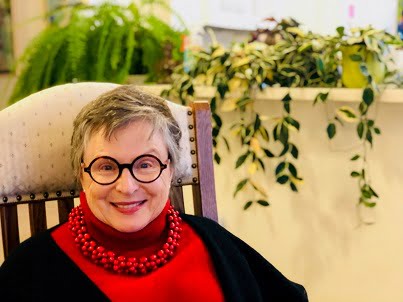Clare Poet Carol Feiser Laque
Clare resident and poet Carol Feiser Laque’s grandmothers opened up the world to her: the world of domesticity and the world of the arts.
“At 9 years of age, my grandmother sent me, ‘101 Famous Poems,’” she says. “From that moment, I knew I would be a poet and poetize. My other grams taught me to make delicious fruit pies (the crust, you know).”
Carol was first published in the 6th grade, which began what would become a lifetime of 20 volumes of poetry. After success in three small arts presses, she published her own work to have artistic control of materials, cover art and layout.
Mainstream publishers required book tours and self-promotion. But Carol believes poetry should be free. Like Petrarch, she never wanted to merchandise her mind. Besides, she considers herself a “homebody.”
“Poetry is alive when it honors the individual’s vision and voice,” she says. “Poetry by committee is as processed as Velveeta.”
To support her poetry habit, Carol taught comparative literature and the poetry workshop at the University of Cincinnati for 36 years. Marriage and motherhood were joys that nurtured and inspired her. And community service provided a means of sharing the art of poetry with runaway and homeless children. In fact, she founded and led a workshop at Lighthouse Youth and Family Services in Cincinnati for 20 years.
In 1975, Carol founded Circumference Press, her own non-profit, independent press for new poets that recently celebrated 40 years in 2015.
“From chapbooks and anthologies to broadsides, I felt the necessity to operate outside the system,” she says. “I was unwilling to compromise aesthetic standards. Every decision involves a price. I have no regrets.”
Projects she founded also include The Cincinnati Writer’s Project – Poetry Workshop, which was free to all. She led it for 35 years.
“Circumference Press published a chapbook of patients’ poetry at the state mental hospital, Longview,” she recalls. “The writer’s workshop named the book, Longerview.
Above all else, poetry is Carol’s calling, and she always aims to honor it.
“Writing poetry is musical,” Carol says. “It celebrates the silent music of the mind and the world of nature. A poem mimes the chime.”
‘Artists Never Retire’
Carol’s retirement from the University of Cincinnati did not represent a true retirement from teaching or poetry. She went on to poetize full time, mentored poets in workshops and enjoyed family life.
Early retirement also afforded Carol the opportunity to continue her work with Circumference Press, publishing special projects. For example, her local Kroger grocery store cashier confided to Carol that she had written short, poetic fables and stories. The result: Circumference Press published The Book of Fabulories.
“My goal is to get the first poem out loud, in print, of poets who have never seen themselves in print,” Carol says. “Every voice is worth hearing. Everyone, no matter who they are, is a poem in progress.”
Carol brought this practice to Chicago, which she calls “The City of Open Arms,” when she decided on senior independent living at The Clare in 2011. Here, the inspiration of having poets write about art resulted in collaboration between a fellow Clare resident and members of an early Clare poet’s workshop.
“The Clare community is an ongoing artistic collaboration,” Carol says. “What is better than poetic jamming with your community?”
Ever since her move to the Windy City, Carol has volunteered and conducted poetry workshops in Chicago elementary schools and held a poetry reading at The Museum of Contemporary Art and The Clare, one of the best retirement communities for active adults. Since her move to Chicago, she also published two poetry anthologies: Poetize and Mother of Pearl.
The seconcd, Mother of Pearl, contains a poetic drama of Hester Prynne, the Mother of Pearl. It was nominated by two of Carol’s editors in 2017 for the 2018 Pulitzer Prize in Poetry.
“I felt honored and humbled, and my muse danced,” Carol says of the nomination.
Today, Carol continues to mentor aspiring poets, and has never stopped writing herself.
“Each poem is a place to live until my imagination evicts me,” she says. “That’s why my Ohio license plates say, ‘Poetize,’ which is a verb, after all.”
Contact us today to learn more and schedule a tour.

